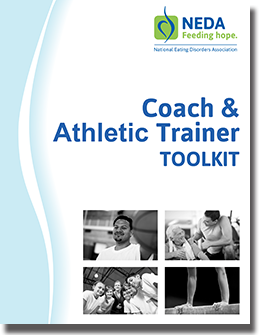Coaches and Trainers
Reviewed by Riley Nickols, PhD, CEDS
Coaches and athletic trainers are on the front lines of athletes’ lives, and often the first to notice subtle changes in mood, behavior, and performance that may indicate an eating disorder. It is important to identify disordered eating or an eating disorder as soon as possible, as early detection is one of the best predictors of full recovery. Athletes who are affected by eating disorders may experience decreased concentration, inconsistent energy, and strength, power, coordination, and speed decrements. Athletes might also experience increased fatigue and perceived exertion, light headedness, dizziness, abdominal pain, and impatience or irritability. Additional, excessive training above and beyond what is required for sport is often a symptom of an eating disorder. It is important for coaches and athletic trainers to recognize these signs in addition to understanding that eating disorders don’t have one “look.”
Tips for Coaches and Athletic Trainers
The following tips may help you support an athlete affected by an eating disorder:
- Approach your athlete sensitively and in private, while being as direct and straightforward as possible.
- Do not judge, criticize, or diagnose your athlete as having an eating disorder.
- Communicate your concerns specific to changes in behavior, mood, or relationships that you have observed. The goal is to help the athlete leverage available support as soon as possible.
- Encourage your athlete to seek treatment from professionals who specialize in both working with athletes and in the treatment of eating disorders.
- Be open and cooperative with the eating disorder treatment team. As a coach, your support of, trust in, and cooperation with the eating disorder care team’s treatment plan will be critical to your athlete’s successful healing and recovery.
- As a coach, your involvement and positive communications are very important for your athletes. Be a source of support. Ask athletes what they need and what might be helpful in their recovery.
- Understand that eating disorders impact all sports. Be especially vigilant if your sport is high-risk for the development of disordered eating (e.g., sports with weight classifications, aesthetic and judged sports, endurance sports).
- Pay attention to your own comments and behaviors about body sizes/shapes, as well as those of team members, while immediately addressing body comparisons between/among athletes as not being supportive to team culture and/or the well-being of athletes.
- Be aware of, and banish, negative messages your sport environment communicates about weight/size/appearance and dieting to your athletes.
Coach and Athletic Trainer Toolkit

The Coach & Athletic Trainer Toolkit is a resource for staff who work in gyms, school settings, outside athletic groups, dance studios, etc. who would like to know how to support athletes who may be affected by eating disorders. We’ve included frequently asked questions and common myths about eating disorders, strategies for assisting athletes and much more!

